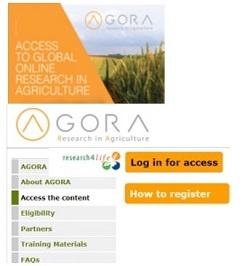From AGORA Workshop in Nepal (29 -30 March, 2018)
11/04/2018

.jpg)
Participants of the AGORA workshop, Lalitpur, Nepal, 30 March 2018
INTRODUCTION
The International Centre for Integrated Mountain Development (ICIMOD), in collaboration with the Food and Agriculture Organization of the United Nations (FAO) held a two-day national workshop on Access to Global Online Research in Agriculture (AGORA) on 29–30 March 2018 at ICIMOD, Lalitpur, Nepal.
This workshop aimed to raise awareness of key trends in scientific publishing in agriculture, environmental science, and forestry and enhance access and use of resources available on the AGORA online platform.
The AGORA programme was set up in 2003 by FAO of the UN in partnership with Cornell University and 65 of the world’s leading science publishers to reduce the scientific knowledge gap between higher income and lower income countries. AGORA is one the five programmes that make up Research4Life (R4L) which includes also Hinari, OARE, ARDI, and GOALI (launched in 2018).
|
|
The Access to Global Online Research in Agriculture (AGORA): * Provides developing countries with access to an outstanding digital library scientific collection (over 10,459 key journals and 26,536 e-books) to aid scholarship in the developing world in discovering evidence, sharing findings, supporting informing teaching, quality practice and public policy on food, agriculture, environmental science, and related social sciences; * Serves more than 3,400 institutions in some 115 of the AGORA eligible countries, Group A and Group B respectively. |
AGORA Workshop in Nepal: Goals and Takeaways
Above sixty library and information science professionals from five university central libraries, university central departments, as well as government and non-government academic and research organizations across Nepal attended the workshop on AGORA at ICIMOD, Lalitpur, Nepal.
The training included presentations and demonstration of tools for online information retrieval, practical exercises, and discussions in plenary session related to access to information in agricultural research, and to different options for information search through the AGORA / R4L.

AGORA search facilities presented by Imma Subirats (FAO of the UN) during the workshop
Participants learned how to search, browse, retrieve AGORA resources, sort search options and use the Summon – which is Research4Life Google-like search engine/Scholar Lilnk that provides a simple way to broadly search for scholarly literature.

|
Do you use Google Scholar? Did you know that the Research4Life programs have created link resolvers which are declared in Google Scholar? As a Research4Life user you can change the Google Scholar settings to your library links. When searching automatically, the links to these collections will be shown in the result list (Settings -> Library Links). AGORA users will look for agriculture keywords and led to AGORA in the end. |
The workshop also introduced International System for Agricultural Science and Technology (AGRIS), - a global public domain database with more than nine million structured bibliographical records on agricultural science and technology.
Thirteen institutions from Nepal were registered to AGORA and a DGroup “AGORA in Nepal DGroup” <[email protected]> mailing list was created to connect AGORA’s users in Nepal. All interested parties that would like to share news and receive updates about AGORA may join AGORA DGroups through the following link: <https://dgroups.org/fao/agora/join>
For more information about AGORA:
- Contact AGORA at: <[email protected]>
- Visit AGORA and AIMS.FAO.ORG portals
|
|
FAO of the UN is working with several partners to facilitate awareness, to foster capacity development activities, and to make agriculture and nutrition data available, accessible and usable to contribute to enhanced food security and good nutrition. |
Related:
From Workshop on AGORA: Global Access to Online Information in Agricultural Research (6 March 2018, Cairo, Egypt)


